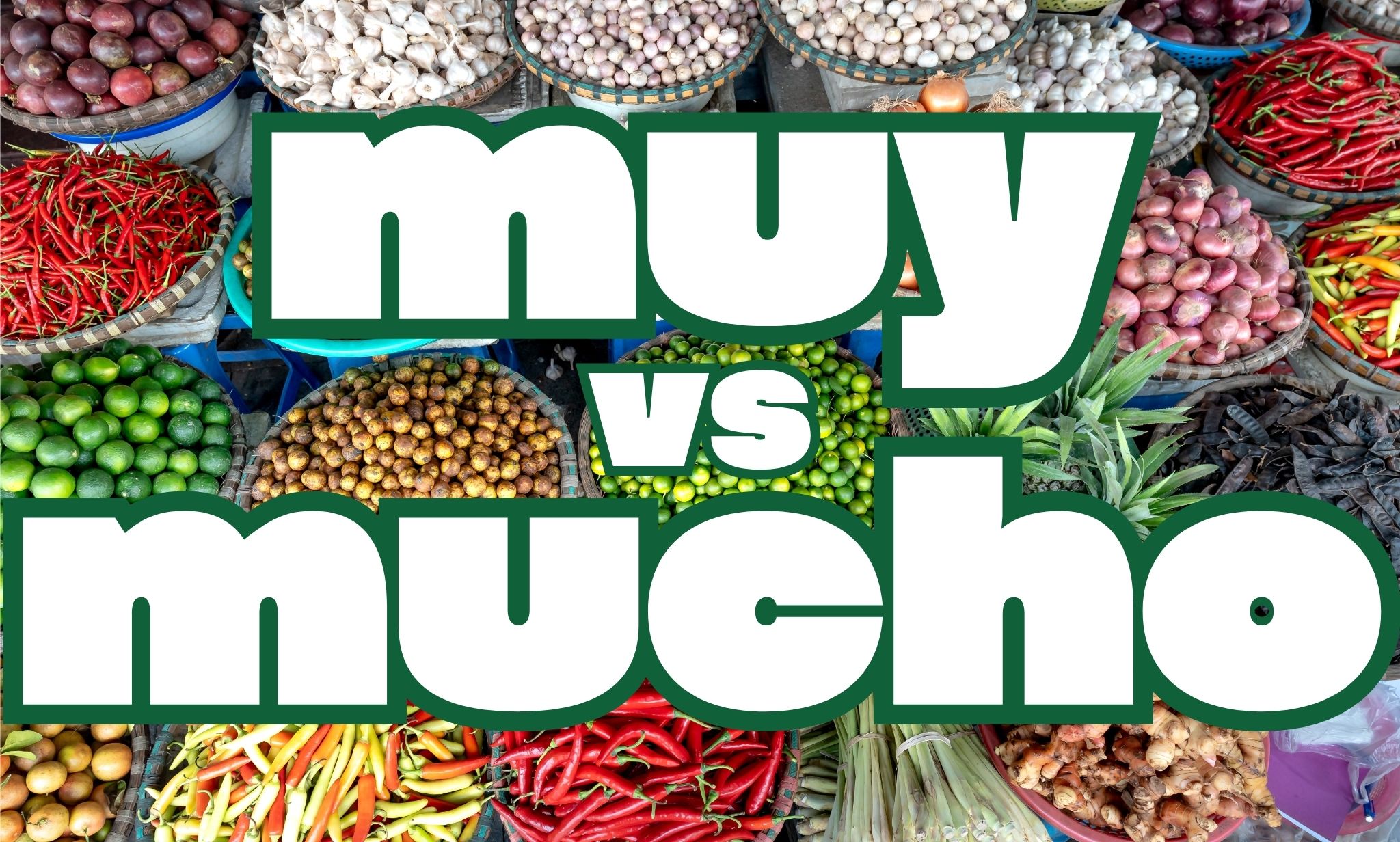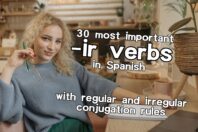Muy vs Mucho in Spanish: A detailed guide

Get our free email course, Shortcut to Conversational.
Have conversations faster, understand people when they speak fast, and other tested tips to learn faster.
More infoMastering the differences between muy vs mucho is sometimes a challenge for Spanish learners, since they have similar meanings referring to degree and quantity.
Muy and mucho are different, however, and have distinct functions. Fortunately, distinguishing the proper uses of muy vs mucho is not as complicated as it may seem. By the end of this post, you’ll realize that it all comes down to whether the word functions as an adverb, an adjective, or a pronoun.
We’ll spend this post going through various explanations of how to use both muy and mucho. For each one, we’ll provide plenty of examples so you see them used in context. At the end, you can see how well you understood everything with a few exercises.
Now without further ado, let’s dive in and see muy vs mucho in action. We know you will thank us very much! – ¡Sabemos que lo agradecerás mucho!
Muy: an adverb
Muy is an adverb, and is the direct translation of very in Spanish. Just like any adverb, muy in Spanish can modify an adjective or another adverb. Like its English counterpart, muy in Spanish is used to intensify the qualities or characteristics of people or things.
For a thorough overview of adverbs in general, take a look at our dedicated post on Spanish adverbs.
Muy before adjectives
When we want to emphasize characteristics of people or things, muy should always be placed before the adjective describing that characteristic.
- Ese documental sobre ballenas fue muy interesante. – That documentary on whales was very interesting.
- Este año no iremos de vacaciones en avión porque los boletos están muy caros. – This year we won’t go on vacation by plane because the tickets are very expensive.
- Las pinturas de Van Gogh son muy coloridas. – Van Gogh’s paintings are very colorful.
Muy before adverbs
In case we need to intensify a quality expressed by an adverb, we use muy to mean very or quite.
- La banda de rock cantó muy bien. – The rock band sang very well.
- El avión aterrizó muy tarde. – The plane landed quite late.
- Mis primos hablan chino muy bien. – My cousins speak Chinese very well.
Mucho: an adjective, and adverb, or a pronoun
Mucho is used to refer to quantities or amounts, and it accompanies verbs or nouns. Mucho can function either as an adjective, an adverb, or a pronoun.
Mucho as an adjective
In this case, mucho can be translated as a lot of, many, or much. When functioning as an adjective, mucho precedes the noun that it modifies. Here, mucho needs to match the noun in gender and number, taking the following forms: mucho, mucha, muchos, muchas.
- Me dio el regalo con mucho amor. – He gave me the present with a lot of love. [Singular and masculine]
- Tengo muchos libros. – I have many books. [Plural and masculine]
- Había mucha gente en la calle. – There were many people on the street. [Singluar and feminine]
- Hay muchas diferencias entre estas dos fotos. – There are a lot of differences between these two photos. [Plural and feminine]
If you’ve noticed you need to brush up on some fundamentals of using adjectives in Spanish, we recommend our post on basic Spanish adjectives.
Mucho as an adverb
Mucho is an adverb of quantity and we use it to emphasize the action of a verb. Unlike mucho functioning as an adjective, this mucho doesn’t change based on gender or number. It comes after the verb it’s describing. The best English translation of mucho is a lot.
- Ayer comimos mucho. – Yesterday we ate a lot.
- Estudiaron mucho y aun así no aprobaron el examen. – They studied a lot and still they failed the exam.
- Los pasajes de avión me costaron mucho. – The plane tickets costed me a lot.
Mucho as a pronoun
Mucho can also work as a pronoun when it refers to a noun that was previously mentioned. As a pronoun, it replaces the noun rather than repeating it. We also need to use the right form of much to reflect the gender and number of the noun it’s replacing. In this context, mucho can be translated as many of them or a lot of of them.
- Algunos de los chicos querían ir al cine, aunque muchos preferían el teatro. – Some of the boys wanted to go to the cinema, though a lot of them preferred the theatre.
- Estuve intentando hablar con algunas mujeres en el bar. Muchas no me contestaron. – I was trying to talk to some women at the bar. Many of them didn’t respond to me.
- ¿Sueles consumir mucha grasa? / Sí, mucha. – Do you usually eat too much fat? / Yes, a lot.
- Mariela sabe mucho. – Mariela knows about many things.
Contrasting Muy vs Mucho
Now in order to provide some clear comparisons to highlight the proper use of muy vs mucho, let’s see the functions of muy and mucho in contrast in a series of contrasting examples.
As we’ve seen before, muy is an adverb while mucho can be an adjective, an adverb, or a pronoun:
- Juan trabaja muy bien. – Juan works very well. [Adverb]
- Juan trabaja muchas horas. – Juan works many hours. [Adjective]
- Juan trabaja mucho. – Juan works a lot. [Adverb]
- Juan trabaja con ingenieros. Muchos faltan al trabajo a diario. – Juan works with engineers. Many are absent from work every day. [Pronoun]
- La tarea es muy difícil. – The homework is very difficult. [Adverb]
- La tarea requiere mucho esfuerzo. – The homework requires a lot of effort. [Adjective]
- Tendremos que esforzarnos mucho para hacer la tarea. – We’ll have to make a lot of effort to do the homework. [Adverb]
- Las tareas son muy difíciles. Muchas son incomprensibles. – The assignments are very hard. Many of them are incomprehensible. [Pronoun]
Another of the main differences between mucho vs muy is that muy doesn’t vary based on gender and number since it’s an adverb, whereas mucho, when acting as an adjective, can take four different forms.
- Había muchas tortas ricas en el cumpleaños. – There were many tasty cakes on the birthday.
- Había tortas muy ricas en el cumpleaños. – There were very tasty cakes on the birthday.
- Ella tiene mucha experiencia en su trabajo. – She has a lot of experience in her job.
- Ella es muy experimentada en su trabajo. – She’s very experienced in her job.
- No tengo mucho dinero en mi cuenta bancaria. – I have not much money in my bank account.
- Tengo muy poco dinero en mi cuenta bancaria. – I have very little money in my bank account.
Idiomatic expressions with Muy and Mucho
In Spanish, there are a number of idiomatic expressions which use muy and mucho differently than the uses we’ve seen so far. Still, many native speakers use some of these on a regular basis so if you know them you can also sound like a native speaker!
Muy
- Muy a mi pesar. – Against my wishes.
- No soy muy de ir a fiestas.- I’m not a big party-goer.
- Esa calle es muy de cafeterías. – That street has loads of cafés.
- Es muy de izquierdas/derechas. – He’s very left-wing/right-wing.
Mucho
- Mucho gusto. – Nice to meet you.
- ¡Mucha suerte! – Break a leg!
- ¡Mucho ojo! – Be careful!
- Lo siento mucho. – I’m so sorry.
- Tú tardas mucho en vestirte. – You take so long to get dressed.
Conclusion
That should be all you need to know about muy vs mucho!
You’ve learned that muy is an adverb, and as such doesn’t change forms between masculine, feminine, singular, or plural. In most contexts, it can be translated into English as very.
On the other hand, you’ve learned that mucho may function as an adjective, an adverb, and a pronoun and that it has plural and feminine forms when used as an adjective and as a pronoun.
We’ve provided you with tons of examples for each of these uses, and also provided a series of contrasting cases. By now, hopefully everything between muy and mucho is crystal clear for you!
Now it’s time to put your knowledge to the test to see how well you grasped the lessons. ¡Tenemos muchos ejercicios para ti! – We have a lot of exercises for you!
Exercises
Complete the sentences using one of the following: muy, mucho, mucha, muchos, muchas.
1. El café está _____ caliente esta mañana.
2. Hoy hemos caminado _____ por la playa.
3. La película fue _____ larga. Nos aburrimos _____.
4. Hay _____ tráfico en la ciudad hoy.
5. _____ personas visitan Paris cada año.
6. Hubo películas _____ interesantes en el cine este verano. _____ no tuvieron éxito.
7. ¡_____ suerte en el examen!
Answers
1. El café está muy caliente esta mañana. – The coffee is very hot today. [Adverb]
2. Hoy hemos caminado mucho por la playa. – Today we’ve walked a lot along the beach. [Adverb]
3. La película fue muy larga. Nos aburrimos mucho. – The movie was very long. We were very bored. [Adverb, Adverb]
4. Hay mucho tráfico en la ciudad hoy. – There’s a lot of traffic in the city today. [Adjective]
5. Muchas personas visitan Paris cada año. – Many people visit Paris every year. [Adjective]
6. Hubo películas muy interesantes en el cine este verano. Muchas no tuvieron éxito. – There were very intresenting films in the movies this summer. Many were not successful. [Adverb, Pronoun]
7. ¡Mucha suerte en el examen! – Break a leg on the exam! [Adjective/Expression]



